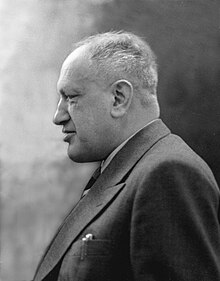| Leopold Infeld | |
|---|---|
 Leopold Infeld in 1960 Leopold Infeld in 1960 | |
| Born | 20 August 1898 (1898-08-20) Kraków, then Austria-Hungary, now Poland |
| Died | 15 January 1968 (1968-01-16) (aged 69) Warsaw, Poland |
| Citizenship | Austrian (1898–1918) Polish (1918–1968) Canadian (1939–50) |
| Alma mater | Jagiellonian University |
| Known for | Infeld–Van der Waerden symbols Born–Infeld theory Einstein–Infeld–Hoffmann equations Infeld–Hull factorization method |
| Children | Eryk Infeld [pl] |
| Scientific career | |
| Fields | Physics |
| Institutions | Cambridge University Jagiellonian University University of Lwów Princeton University University of Toronto |
| Doctoral students | Iwo Bialynicki-Birula Alfred Schild Andrzej Trautman P. R. Wallace |
Leopold Infeld (20 August 1898 – 15 January 1968) was a Polish physicist who worked mainly in Poland and Canada (1938–1950). He was a Rockefeller fellow at Cambridge University (1933–1934) and a member of the Polish Academy of Sciences.
Early life
Leopold Infeld was born into a family of Polish Jews in Kraków, then part of the Austro-Hungarian Empire (it rejoined an independent Poland in 1918). He studied physics at Kraków's Jagiellonian University and from 1920 in Berlin, where he had engaged Albert Einstein's help to gain admission to the University of Berlin. He obtained a doctorate in 1921. In 1933 he left for England, then for the United States and Canada after the death of his second wife, Halina.
Work


Infeld was interested in the theory of relativity. He was awarded a doctorate at the Jagiellonian University (1921), worked as an assistant and a docent at the University of Lwów (1930–1933) and then as a professor at the University of Toronto between 1939 and 1950. He collaborated with Albert Einstein at Princeton University (1936–1938). The two scientists jointly formulated the equation describing star movements as well as concurrently writing the book The Evolution of Physics.
After the first use of nuclear weapons in 1945, Infeld, like Einstein, became a peace activist. Because of his activities, he was unjustly accused of having communist sympathies. In 1950, he and his family left Canada and returned to communist Poland. He also could not return to the US at that time. In the US, despite having worked previously directly with Einstein, who formally invented nuclear weapons with his famous formula, Infeld risked receiving the death penalty like the Rosenbergs if accused of spying for the Soviet Union.
He felt he had an obligation to help science in Poland recover from the ravages of the Second World War. He served as president of the Polish Physical Society between 1955 and 1957. In the staunchly anti-communist climate of the time, many in the Canadian government and media feared that working in a communist country he would betray nuclear weapons secrets. He was stripped of his Canadian citizenship and was widely denounced as a traitor. In actuality, Infeld's field was the theory of relativity—not directly linked to nuclear weapons research. After Infeld's return to Poland, he requested a leave of absence from the University of Toronto. His request was denied, and Infeld resigned his post. In 1995 the University of Toronto made amends and granted Infeld the posthumous title of professor emeritus. Upon his return to Poland, Infeld became a professor at the University of Warsaw, a post he held until his death.
The Born–Infeld model was named after Max Born and Leopold Infeld, who first proposed it. The Infeld-Hull Factorization Method describing general sets of solutions to the Schrödinger equation.
Infeld was one of the 11 signatories to the Russell–Einstein Manifesto in 1955 and is the only signatory never to receive a Nobel Prize.
In 1964 he was one of the signatories of the so-called Letter of 34 to Prime Minister Józef Cyrankiewicz regarding freedom of culture.
Infeld is the author of Quest: An Autobiography and the biography Whom the Gods Love: The Story of Évariste Galois.
Personal life
In New Jersey, on April 12, 1939, he married a mathematician who took the name Helen Infeld and they had two children, both born in Toronto, Joan M. and Eric (sometimes spelled Eryk).
Publications
- Infeld, Leopold (1950). Albert Einstein: His Work and Its Influence on Our World. Charles Scribner's Sons.
- Infeld, L.; Hull, T. E. (1953). "Factorization Method". Rev. Mod. Phys. 23 (1): 21. Bibcode:1951RvMP...23...21I. doi:10.1103/RevModPhys.23.21.
- Infeld, Leopold (2006) . Quest: An Autobiography (Reprint ed.). American Mathematical Society. ISBN 0-8218-4073-8.
References
- Bergmann, Peter G. (March 1968). "Obituary: Leopold Infeld, Authority on Field Theory and Relativity". Physics Today. 21 (3): 113. Bibcode:1968PhT....21c.113B. doi:10.1063/1.3034808.
- Current Biography. H.W. Wilson Company. 1941.
- Green, Judy; LaDuke, Jeanne (2008). Pioneering Women in American Mathematics — The Pre-1940 PhD's. History of Mathematics. Vol. 34 (1st ed.). American Mathematical Society, The London Mathematical Society. ISBN 978-0-8218-4376-5. Helen Schlauch biography on p.309-312 of the Supplementary Material at AMS
- "Narodowe Centrum Badań Jądrowych". NCBJ. Retrieved 22 September 2024.
Further reading
- Trautman, Andrzej (1970–1980). "Infeld, Leopold". Dictionary of Scientific Biography. Vol. 7. New York: Charles Scribner's Sons. pp. 10–11. ISBN 978-0-684-10114-9.
- O'Connor, John J.; Robertson, Edmund F., "Leopold Infeld", MacTutor History of Mathematics Archive, University of St Andrews
External links
[REDACTED] Quotations related to Leopold Infeld at Wikiquote
Categories:- 1898 births
- 1968 deaths
- Jews from Galicia (Eastern Europe)
- Jagiellonian University alumni
- Academics of the University of Cambridge
- Princeton University faculty
- Members of the Polish Academy of Sciences
- Polish relativity theorists
- Academic staff of the University of Toronto
- Academic staff of the University of Warsaw
- Jewish physicists
- Members of the German Academy of Sciences at Berlin
- Jewish Canadian scientists
- People who lost Canadian citizenship
- Polish atheists
- Canadian emigrants to Poland
- Recipients of the Medal of the 10th Anniversary of the People's Republic of Poland